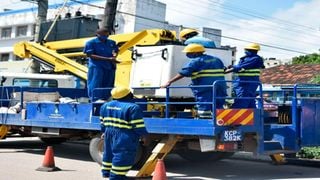
Kenya Power technicians carry out repairs on an electricity line along Haile Selassie Road in Mombasa on December 5, 2020.
Business
Premium
MPs to vet power purchase deals in proposed law
What you need to know:
- Interestingly, some 8.24 billion Kwh procured directly from Kengen cost Kenya Power Sh40.92 billion.
The National Assembly will have to approve all power-purchasing agreements entered between Kenya Power (KP) and private electricity producers if a new Bill becomes law.
The Public Private Partnership Bill 2021 comes in the wake of revelations that Kenya Power (KP) has been locked in expensive power purchasing agreements (PPAs) entered with 19 independent power producers (IPPs).
Some of these PPAs, it emerged, date back to more than 25 years.
Ironically, the same power can be purchased at a cheaper rate from the state-owned Kenya Electricity Generating company (Kengen).
Currently, the Energy Cabinet Secretary has the final say on PPAs and the role of MPs is limited to appropriating funds for purchasing power.
But an amendment Garissa Township MP Aden Duale has proposed to the Bill sponsored by Leader of Majority Amos Kimunya seeks to throw open the procurement of power by KP, which has the monopoly of power distribution across the country.
The Bill, which cuts across all sectors of the economy, seeks to enhance efficiency in the regulation of public private partnerships.
However, Mr Duale says this can only be achieved through introduction of control measures and seeking public participation on how private entities should be brought on board.
“A Cabinet secretary responsible for a contracting authority that enters into a power-producing agreement with a private party shall submit the agreement for approval by the National Assembly,” reads Mr Duale’s proposed amendment to Clause 62 of the Bill.
Huge difference
This comes after MPs raised questions on the huge difference between the rates at which KP procures electricity from the 19 private dealers and the rates that apply when procuring from Kengen.
KP pays Kengen and IPPs for energy delivered, fuel used in the generation and capacity charges for each power purchase agreement.
A document presented to the National Assembly by Energy Cabinet Secretary Charles Keter shows during the 2019/20 financial year, Kenya Power paid the IPPs Sh50.22 billion for 2.9 billion Kwh of energy supplied.
Interestingly, some 8.24 billion Kwh procured directly from Kengen cost Kenya Power Sh40.92 billion.
This means energy bought directly from Kengen is cheaper than that from IPPs.
Simple calculation shows it cost KP Sh4.90 for each Kwh bought from Kengen, compared to the Sh17.30 it spent per Kwh on the energy supplied by the private power producers.
Interestingly, the power the IPPs supply is bought from Kengen at Sh0.50 per Kwh hour and later offloaded to KP at the inflated rate.
It is not clear why KP prefers to buy from the IPPs when the same power can be sourced at a cheaper rate from Kengen, the country’s largest power producer with several power plants across the country.
When questioned about the huge difference, Mr Keter was cagey.
“The different power plants are priced differently depending on various factors, a major one being the source of power,” Mr Keter said in a response filed in the National Assembly to a question sought by Mr Duale.
Mr Duale further seeks to have any PPA entered into before the commencement “of this Act” submitted to the National Assembly for approval within nine months of coming into force of the law.
Failure to have the existing agreements ratified by the National Assembly would see the deals being vitiated or voided by attrition of time.
Annual audits
On the other hand, if the National Assembly fails to consider and make a decision on the agreements within 90 days from the date they are tabled in the House, the agreements shall be deemed to have been approved.
Mr Duale’s proposed improvements on the Bill further empower the Office of the Auditor-General to carry out annual audits of all power purchase agreements.
“The Auditor-General shall evaluate whether the citizen has obtained value for money in the power purchase framework and submit reports to the National Assembly for consideration,” says Mr Duale.
The document Mr Keter presented to the National Assembly lists 19 IPPs that are currently doing business with the government.
They include Iberafrica-plant 2, Mumias Sugar Company, Orpower4- plant I, Orpower4- plant II, Orpower4- plant III, Tsavo power, Rabai power, Imenti Tea-Hydro and Thika power.
The others are Gikira hydro power, Gulf power, Triumph power, Orpower4- plant IV, Biojoule, Regen Terem, Chania- KTDA, Gura- KTDA, Strathmore solar and Lake Turkana Wind Power.
Mr Keter did not, however, provide the ownership details of the IPPs, noting they are contractual and would require legal clearance before they are revealed.




